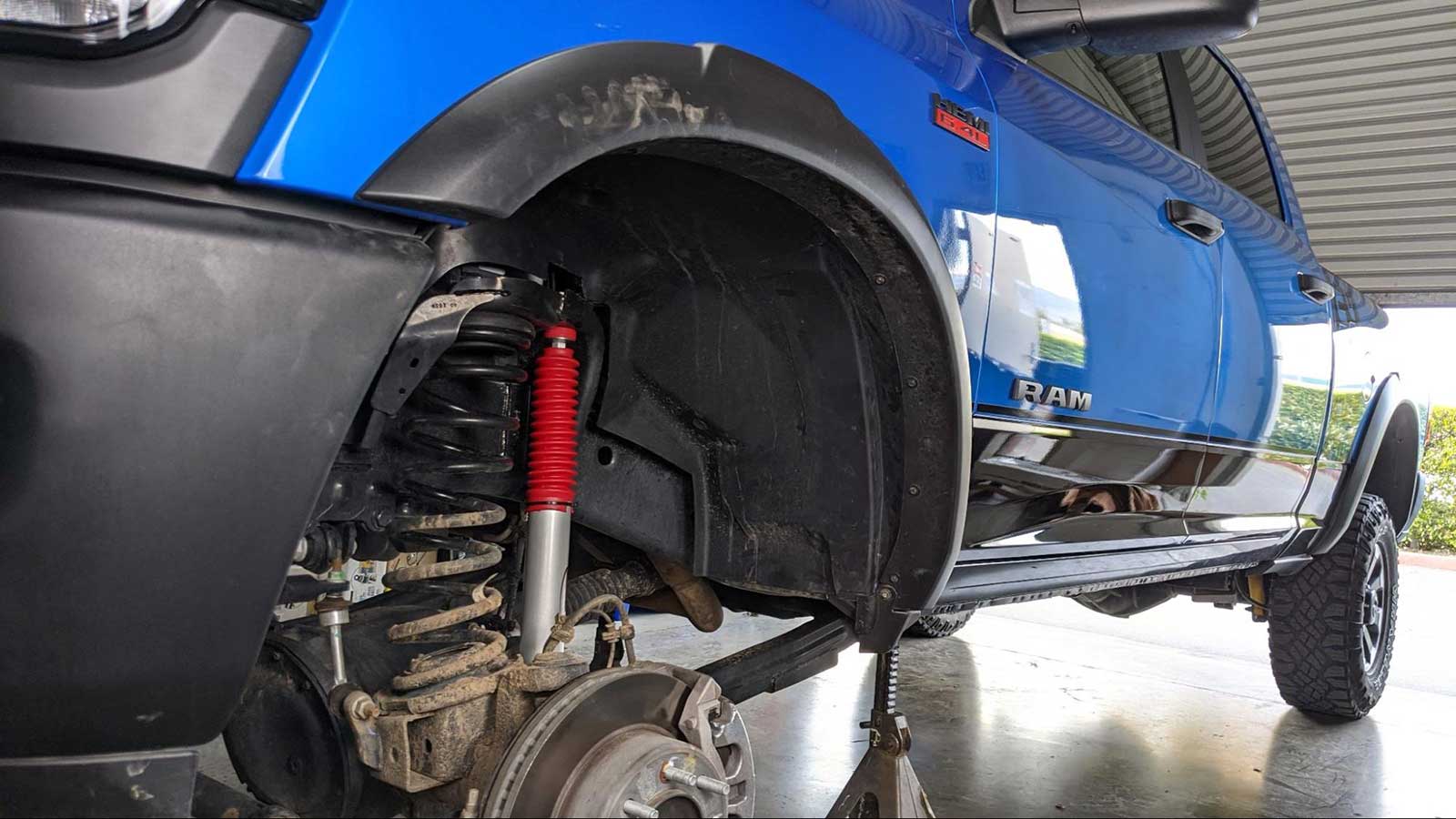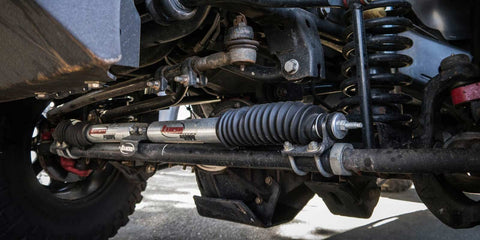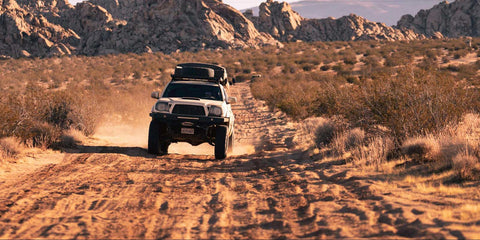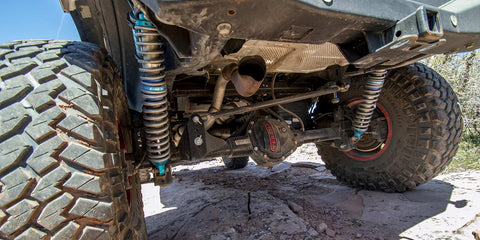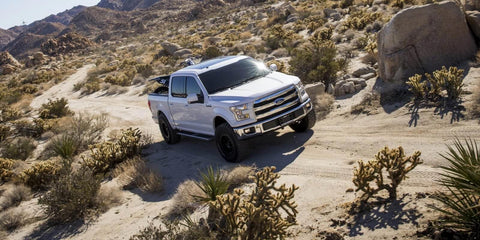The Lowdown: Rancho RS9000XL Shocks
Posted by Brandon Sevestre on
One of Shock Surplus’ best-selling shock series warranted a full-ride test and review on our vehicle. We knew that heavy-duty customers, towing vehicles, and drivers that wanted some versatility in their ride would opt for the adjustable Rancho RS9000XL shocks. So what did we do? Got a heavy-duty vehicle! If you didn’t see previously, we picked up a Ram 2500 Power Wagon, to further our own experiences and education in the solid front axle space, towing, and dealing with a lot of weight on the road.
This truck came equipped with factory Bilstein shocks, specifically ones equivalent to the 4600 Monotube series that Bilstein offers in the aftermarket. Off the lot, this vehicle handled exceptionally well for being a 7500lb truck that has 14” of clearance and a high center of gravity. The 33” Duratrac tires and digressive Bilstein shocks provided excellent road feel and dare I say - sportscar-like handling and being flat through the turns.
Initial Impressions
During the first thousand miles or so, we noticed very little difference in ride behavior between the settings on a daily drive. It was very hard to discern the difference in the settings, you could get a mild sense of change between full soft and full hard. On the hard stuff or washboard, you could tell a lot more, but those are rare scenarios, and we were hoping we’d see a bigger change in everyday driving.
After a couple thousand miles the shocks seemed to have loosened up in general, and the differences in settings were much more perceptible. This is also why we had to wait to do our review after about 5k miles, to make sure we had a good sense of wear-in.
Adjusting for Behavior
- For long highway rides, we’ve been sitting in the middle settings of adjustment, not too soft since we don't like the boaty/swaying feeling, and still want a modicum of handling.
- For the streets in the city, we like to turn the settings all the way up to get as tight as possible for all the turns, obstacles, and unpredictability.
- For the slower trails we keep the shocks pretty soft, depending on vehicle weight loadout, and passengers. Slow going rocky trails get really dumbed down with deflated tires and soft shock settings, the ride can get remarkably soft. But you’re also left with a lot of sway on the bigger obstacles or unknown.
- For higher speed desert terrain where we’re going anywhere from 20-50mph, we turn the settings all the way up as firm as they go, because we’re more concerned here with traction and handling, not comfort.
- By increasing the compression on the shocks, we're preventing bottom-out from the suspension, along with increasing the rebound so the front end bucks less coming out of a dip or over an obstacle.
Learn More: Troubleshoot Suspension Behavior
On-Road Performance
There’s a significant and noticeable amount of change between the softest and firmest settings on the RS9000XL shocks. We can see why these shocks are coveted by heavy-duty vehicles, the versatility of adjustment and ride-behavior change is very apparent.
On the softest settings, you can expect a slight boaty/floaty feel on the highway, where you’ll feel small bumps and holes, but the impact on the vehicle is very mild. One area of concern with the soft settings is highway joints, where there’s a significant change in the pavement, oftentimes bucking the vehicle. This becomes a lot more pronounced with softer shock settings and may be unwanted if you’re in a major metropolitan area.
Firmer settings lead to a tighter handling experience, less body roll, less nose-dive under braking. The firm settings are also great for mountain roads since there’s a lot of turns, both fast and slow. Bumps and potholes are more pronounced with the firmer settings, you’ll definitely feel them, but the vehicle will not miss a beat. Highway-joint behavior is vastly different, and much more confidence-inspiring, with the firmest settings on these RS9000XL.
Off-Road Performance
There are various types of off-road terrain, so we’ll get specific on what to expect out of the shocks in the scenarios we’re accustomed to and have driven, with the RS9000XL shock performance top-of-mind.
Rocky Trails, Mountain Terrain, Small to Medium Rocks, and Obstacles
- Soft settings resulted in a lot of body roll through pits, medium rocks, and inconsistent terrain. No real loss of traction, but if you’re slow going, you’ll be moved around a lot, especially with additional weight.
- Firmer settings felt more of the dirt and rocks, but much less body roll. You can confidently push the speed more, as the firmer compression in the shocks will eat up more medium or large obstacles or terrain change, without bucking of the vehicle.
Desert Terrain, Wide-Open Trails, Fast Speeds
- Soft settings aren’t preferred here if you’re going 20mph or faster, or driving spirited around turns, or low visibility. If you hit unexpected obstacles or whoops with soft settings, your front end will buck hard and the tires will leave the ground upon rebound.
- Firmer settings are where it’s at when running any off-road terrain at speed, the firmer compression and rebound settings mean that tire traction isn’t compromised behind comfort. You’ll feel more, but with firmer settings, you have more bottom out and top out protection (hard clunks from the suspension on hard hits).
Fire Roads, Campground Scouting
- Soft settings here are nice if you’re taking it easy. You’ll still see some body roll, but with more tame terrain, it’ll be a soft plush scenic ride.
- Medium settings may be preferred here, a good mix of less body roll, comfort, and handling in the event of anything unexpected - whether terrain-related or smashing that pedal for some spirited driving.
The Lowdown on the RS9000XL
Rancho has dominated, and mostly monopolized the affordable shock space for light and heavy-duty trucks. There’s no other sub-$500 option for adjustable shocks out there right now, so the RS9000XL is in a category of its own. If you’re a stickler for ride quality, or you want equipment that can do double duty with your truck, these are a fantastic choice.
These shocks have surprised (shocked) us! We’re used to running adjustable high-performance race parts on our IFS vehicles, providing a high level of versatility depending on driving scenario. The RS9000XL also provided noticeable differences between the settings, and addressed handling considerations for our given terrain. Whether you’re after a softer ride, better handling, or you actually dont know what you want and need to get a feel for the differences, the RS9000XL is a solid choice.
Rancho RS9000XL Longevity & Durability
- There’s quite a big range of feedback regarding how long these Rancho RS9000XL Adjustable shocks last, ranging from 50-100k miles. The adjustability of them really go a long way in dialing in the handling or comfort, depending on what the driver needs.
- The tri-tube design, along with the components built around the adjustments, means there’s more moving parts compared to a standard twintube or monotube shock. This generally increases warranty risk, but we dont get many warranty requests on this line.
- Rancho’s warranty covers a 90-day ride guarantee, which means if you dont like the way these shocks perform, you can send them back to Rancho, pretty awesome.
The RS9000XL shock is the only budget-friendly adjustable shock option available for most heavy duty and light duty trucks, and by budget friendly, we mean sub-$500 for a set of 4. The next closest adjustable option is the Fox 2.0 CD Adjustable Reservoir setup, which come in around $1200 for the set. Its safe to say that Rancho is filling a big gap in the market right now, and has been for the past couple of decades with this shock.


